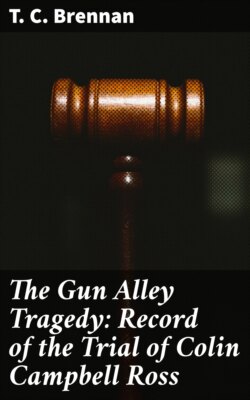Читать книгу The Gun Alley Tragedy: Record of the Trial of Colin Campbell Ross - T. C. Brennan - Страница 5
На сайте Литреса книга снята с продажи.
THE APPELLATE COURTS.
ОглавлениеTable of Contents
At the outset it is desirable to correct a wrong impression which, very widely felt, has tended to allay the feeling of uneasiness in the public mind. Ross, as is well known, appealed to the Full Court of Victoria, which dismissed the appeal. Thence he carried his case to the High Court of Australia, which refused, one learned Judge dissenting, to interfere with the decision of the Supreme Court. From this fact it has been assumed that two Appellate Courts, consisting of three Judges and five Judges respectively, have endorsed the verdict of the jury. Nothing could be further from the facts. Substantially what the Appellate Courts were asked to say was (1) that there was no evidence on which a jury could rightly convict Ross; (2) that the Judge had failed to direct the jury properly on various points enumerated. To take the second point first, the Courts both declined to say that there was any non-direction, though Mr. Justice Isaacs, in the High Court, held that on one point the Judge had failed to direct the jury properly.
As to the first point, the position is this: An Appellate Court will not interfere with the finding of a jury if there is any evidence on which a jury could find as it did. It will not weigh the evidence to see on which side the balance lies. That is the function of the jury, and the Court will not usurp that function.
That position was made quite clear in the judgments of both Courts. In the Supreme Courts the Chief Justice of Victoria said: “There was abundance of evidence, if the jury believed it, as the jury apparently did believe it, to support their finding, and we need add nothing more upon that point.” In the High Court, the Chief Justice of Australia, speaking for the majority of their Honours, dealt with the same point thus: “As we have before indicated, there was, in our opinion, abundant evidence, if the jury believed it, to sustain their verdict. But we desire to add that, if there be evidence on which reasonable men could find a verdict of guilty, the determination of the guilt or innocence of the prisoner is a matter for the jury, and for them alone. And with their decision, based on such evidence, no Court or Judge has any right or power to interfere. It is of the highest importance that the grave responsibility which rests on jurors in this respect should be thoroughly understood and always maintained.” Even Mr. Justice Isaacs, who dissented from the majority on a point not material to this review, was quite at one with his learned brothers on this matter. “The ground upon which,” said his Honour, “I agree to a rejection of all the other grounds brought forward by Mr. Brennan is that, however powerful the considerations he advanced, however tainted and discrepant and improbable any of the facts relied on by the Crown might be, that was all matter for the jury alone, and I have no right to express or to form any opinion about them in favour of the prisoner.”
No Court and no Judge has, therefore, ever pronounced judgment on the correctness or incorrectness of the jury’s verdict. All that they have said is that there was some evidence on which the jury could find as it did, and that that being so, the responsibility for the verdict must rest with the tribunal which the law has set up to pronounce upon the evidence. The purpose of this review of the case is to show, not that the Appellate Courts were wrong, but that there are strong grounds for believing that the jury was wrong. And that brings us naturally to a second preliminary point.
